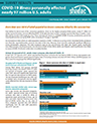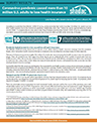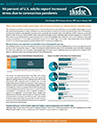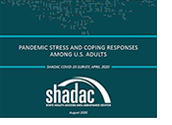Resource: Analysis from the SHADAC COVID-19 Survey
What is the SHADAC COVID-19 Survey?
The SHADAC COVID-19 Survey is a two-part survey initially designed by our researchers* to measure the impacts of the novel coronavirus on a variety of experiences for adults in the United States. The survey was conducted as part of the AmeriSpeak omnibus survey conducted by NORC at the University of Chicago using a mix of phone and online modes among a nationally representative sample of 1,007 respondents age 18 and older.
The first iteration of the survey was fielded in late April 2020, and questions focused on health insurance coverage, access to and cost of care during the pandemic, as well as COVID-related stressors and coping mechanisms.
A second version of the survey was again fielded in April of 2021, with questions aimed at understanding respondents’ experiences with illness and death due to COVID-19 for themselves, their families, and their contacts.
* SHADAC appreciates contributions to the survey by Sarah Gollust of the University of Minnesota School of Public Health and Brendan Saloner of the Johns Hopkins University Bloomberg School of Public Health.
Product from the 2021 SHADAC COVID-19 Survey

COVID-19 illness personally affected nearly 97 million U.S. adults (Report)
In April 2021, researchers fielded an updated version of the SHADAC COVID-19 Survey. Results from the survey showed that almost 40% of adults in the U.S. know someone who has died from COVID (37.7 percent) or either themselves have, or had a family member who has, contracted COVID (37.6 percent). Analysis for this survey also looked at the data by racial and ethnic subgroups, as well as income and education levels, and by age.
Products from the 2020 SHADAC COVID-19 Survey
 Coronavirus pandemic caused more than 10 million U.S. adults to lose health insurance (Report)
Coronavirus pandemic caused more than 10 million U.S. adults to lose health insurance (Report)
Results from the 2020 SHADAC COVID-19 Survey found that more than 10 million U.S. adults lost their health insurance due to the coronavirus pandemic, and more than 7 million U.S. adults reported delaying medical care for COVID-19 symptoms due to worry about costs. The report also examined changes in access to care due to the pandemic, and provided additional analysis for racial/ethnic subgroups and by income levels.
 90 percent of U.S. adults report increased stress due to pandemic (Report)
90 percent of U.S. adults report increased stress due to pandemic (Report)
This brief highlights key results from the survey relating to stress and coping mechanisms, with 90.4 percent of U.S. adults reported feeling additional levels of stress specifically caused by the COVID-19 pandemic. This portion of the survey also asked respondents about their coping strategies for the added stress, such as changes in eating, drinking, smoking, or exercising habits, as well as social relationships.

From the results of the 2020 SHADAC COVID-19 Survey, SHADAC created two chartbooks that provide clear, informative visualizations of responses to a variety of individual questions from both sections of the survey. The chartbooks are divided by overall category—health insurance coverage and access to/utilization of care in the first and stress and coping responses second—and include breakdowns by age, gender, race/ethnicity, chronic condition, health status, educational attainment, income level, and metropolitan area.
US Adults’ Preferences for Public Allocation of a Vaccine for Coronavirus Disease 2019 (Journal Article)
As vaccines for COVID-19 are developed, federal agencies must decide which groups should receive priority in receiving shots (e.g., elderly people, front-line health care workers, people with existing medical conditions, etc.), as vaccine demand is expected to exceed supply. This article sought to understand and map the public’s preferences for allocating a COVID vaccine to differing portions of the populations, as public engagement can contribute to resource allocation decisions and legitimacy.
Access and enrollment in safety net programs in the wake of COVID-19: A national cross-sectional survey (Journal Article)
With the pandemic causing unprecedented job loss and financial strain, SHADAC researchers and collaborators looked to understand how U.S. adults experiencing economic impacts might seek assistance from an array of safety net programs. Results showed 28.1% of individuals experienced an employment reduction (job loss or reduced earnings) due to COVID, and that 50.0% of those individuals were enrolled in at least one safety net program—compared with 39.0% pre-pandemic.




